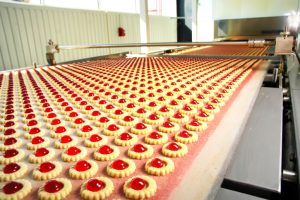by CharlieB | May 28, 2017
 At KenBay, we strive to achieve our goal of a zero waste initiative. But that doesn’t mean we don’t also want to make sure your job is as easy as possible. We recognize the importance of manufacturing plants, especially when those plants are for companies making food! We all love food, and who can resist a delicious bite of a cookie? Unfortunately, while we may all appreciate the end result, we hardly ever think about what happens behind the scenes. Food manufacturers need to keep on top of their budget as well. Sometimes that means buying product in bulk and purchasing wholesale baking ingredients. But are these hefty sacks of flour, starch, and other good really saving that much money? For some people, they might not be! How do you know the true cost of wholesale baking ingredients? We are glad you asked!
At KenBay, we strive to achieve our goal of a zero waste initiative. But that doesn’t mean we don’t also want to make sure your job is as easy as possible. We recognize the importance of manufacturing plants, especially when those plants are for companies making food! We all love food, and who can resist a delicious bite of a cookie? Unfortunately, while we may all appreciate the end result, we hardly ever think about what happens behind the scenes. Food manufacturers need to keep on top of their budget as well. Sometimes that means buying product in bulk and purchasing wholesale baking ingredients. But are these hefty sacks of flour, starch, and other good really saving that much money? For some people, they might not be! How do you know the true cost of wholesale baking ingredients? We are glad you asked!
KenBay supports manufacturers just as much as the environment. Visit our website to learn more about who we are, how we work, and what we can do for you!
THE COST OF WHOLESALE BAKING INGREDIENTS
It doesn’t matter whether you are running your own plant or just buying your weekly groceries, the truth is the same: buying bulk means buying heavy. In this case, baking ingredients come in huge heavy sacks, often weighing up to fifty pounds! But wait! You may think that cost savings happen because buying bulk means buying less often over time. While that may be true, there are other factors at play as well. For example, are the sheer amount of discarded bags overwhelming your plant floor? They don’t just look unsightly, they create a workspace hazard as well. What about the cost of moving them elsewhere? Factor in the man hours and cost of labor, and you can see how quickly the savings dwindle. Finally, ask yourself how much those sacks are overrunning your dumpster. Are you having to schedule more trips to the landfill overall because you can’t use your dumpster otherwise? Again, if the answer is yes then its time for a change!
WHAT YOU CAN DO
One of the things that you can do is to dump those sacks for wholesale baking ingredients into a compactor right away. A portable compactor is best, that way you can place it right where you need it and not have to worry about paying for extra hauling labor. Since the sacks are so big and durable, it is also important to make sure your compactor is powerful, able to handle a heavy duty load with ease. Fortunately for you, such a compactor exists. KenBay’s RotoPacs are small enough to be mobile but mighty enough to handle even the toughest waste loads. We offer a special try it before you buy it program, so that you can see for yourself the difference one RotoPac can make. Best of all, if you like the test run, you have the option to keep it for life! Simply pay the difference in cost, and the RotoPac we let you borrow becomes your official property. If you would like to learn more about the RotoPac or any of our other fantastic compactors, visit our website today. Don’t bake yourself into a corner when it comes to your bulk sacks. Turn to KenBay to keep your floor clean and your wallet happy!
by LaurenL | Oct 13, 2016
 For many businesses, a common barrier to recycling is a lack of resources. For businesses that handle recyclable cans, PET bottles, or cartons, depackaging equipment can help. While there are depackaging companies that can handle this task for you, many businesses now opt to complete the simple process themselves. Typically, these types of containers are not recycled because, in order to do so, they must first be rinsed of their liquid waste. A depackaging machine can do this task for you, while also benefiting your recycling efforts in other surprising ways. Here’s how.
For many businesses, a common barrier to recycling is a lack of resources. For businesses that handle recyclable cans, PET bottles, or cartons, depackaging equipment can help. While there are depackaging companies that can handle this task for you, many businesses now opt to complete the simple process themselves. Typically, these types of containers are not recycled because, in order to do so, they must first be rinsed of their liquid waste. A depackaging machine can do this task for you, while also benefiting your recycling efforts in other surprising ways. Here’s how.
1. No Pre-Cleaning Required
Depackaging is an integral part of waste management processes for zero waste businesses in the food industry. Thanks to this technology, they can easily separate recyclable containers from the food waste that may be inside. Food depackaging equipment varies, but popular models either unscrew bottles, or perforate cans, cartons, and bottles and then rinse whatever liquid is contained inside. This is particularly good for depackaging milk, yogurt, soft drinks, BBQ sauces and ketchup, ice cream, liquid soaps and detergents, and more.
Often, precleaning keeps people from recycling. However, with the right depackaging equipment, you can simply throw full containers into the machine. These containers are perforated or unscrewed by the machine. Then, the depackaging equipment works its magic. Food waste and other liquids inside containers are removed.
2. Recyclable Material is More Easily Managed
Not only does depackaging save you time that would otherwise be devoted to emptying containers of their waste, it can also save you money in your pursuit of zero waste. The best depackaging systems also have compaction chambers. After your containers are perforated and emptied, they are shredded or compressed tightly. With depackaging equipment that also has a high compaction rate, you’ll be able to load more recyclable waste on a single truck and make fewer trips to recycling centers or Waste to Energy plants. Because of this, you’ll spend less money on managing your recyclable waste.
3. Non-recyclable Items Can Be Repurposed
A little-known fact: depackaging equipment can also help businesses manage non-recyclable items like styrofoam or other similar materials. If your business is often left with EPS Polystyrene fish boxes and packaging, EPS dust, polypropylene packaging and insulation foam, or polypropylene (EPP) packaging, depackaging equipment can help you manage this waste. Like recyclables, these items can be emptied of any waste they may hold.Then, the foam that is left over can be condensed to create large blocks of foam. These blocks can then be sold, creating a new revenue stream for your business.
Integrate Depackaging Into Your Waste Management Process with KenBay!
If you think your waste management process could benefit from depackaging, let KenBay help you find the perfect equipment to get the job done. Our SC 2000 and SC 3000 Screw Compactors are configured for depackaging, dewatering or foam densifying. If you want to make your facility landfill free, these screw compactors can be an integral part of your waste management system. Low maintenance and heavy-duty, a KenBay screw compactor is capable of handling large throughputs of material while still maintaining a high compaction rate continuously throughout the operation.
We know that waste management can be a burden. But, with KenBay, you’ll have the tools you need to help make the job a little easier. The next time you evaluate your waste products and waste management strategy, consider integrating one of our industrial trash compactors into your processes.
Because our depackaging trash compactors will reduce the weight and size of your recyclable waste, they are a great way to cut down your waste removal costs and improve the efficiency of waste management.
Don’t let something like waste get in the way of your business operations. If you’re interested in learning more about depackaging or finding a committed consultant to help you reduce your waste, call KenBay. We can tell you more about our services, no matter what industry you’re in, or how much waste you are creating!
Photo credit: Getty Images / photka
by charlotte | Apr 27, 2016
 The food manufacturing industry is one of the biggest producers of waste out there, weighing in at an almost unbelievable 7.1 billion pounds annually. Of the largest food manufacturing organizations in existence – like grocery stores and international chain restaurants – the majority of this waste is diverted from landfills. With the food waste itself, there are many avenues to follow in order to reduce the amount that goes in the trash, but packaging is the real kicker. There isn’t a way to avoid packaging when you’re working in food manufacturing, so it’s time to find the most efficient way to dispose of it. First, let’s look at ways to repurpose food waste.
The food manufacturing industry is one of the biggest producers of waste out there, weighing in at an almost unbelievable 7.1 billion pounds annually. Of the largest food manufacturing organizations in existence – like grocery stores and international chain restaurants – the majority of this waste is diverted from landfills. With the food waste itself, there are many avenues to follow in order to reduce the amount that goes in the trash, but packaging is the real kicker. There isn’t a way to avoid packaging when you’re working in food manufacturing, so it’s time to find the most efficient way to dispose of it. First, let’s look at ways to repurpose food waste.
Recycle Food Waste
If you have foods that are not yet inedible, but rather just a tad past the date that you’re comfortable selling them, look for shelters in the area that take donations and get that food into someone’s belly. With all the hungry people in our country, it’s a shame that any food goes to waste. When food does pass the point of being edible for humans, consider animal feed. There are plenty of farmers around you who would gladly take your gallons of scraps and old food to feed their livestock. If you haven’t already considered a collaboration with farmers, many businesses work on trade in this way with their producing counterparts. Compost is another great use for food scraps, and farmers would probably be just as glad to add your food waste to their compost piles to get their fields growing.
Recycle & Reuse
When it comes to packaging, the first step should be to recycle and reuse whatever you can. Buckets and other containers are great for both freezer and cooler storage, and are typically quite durable. When you’ve used them until they’re falling apart, make sure they make it into the recycling bin where they will be broken down and made into other products, instead of in the trash where they will end up in the landfill. Most people aren’t aware that most plastic wrapping can also be recycled. Whether it’s the bags that your veggies come in or the plastic wrap you used to seal something up, get it all in that recycling bin.
Compact It
Now let’s talk trash compaction. Trash compactors are ideal for the food manufacturing industry. The RotoPac SacPac, made by KenBay, is designed specifically for food manufacturing, and will reduce your waste by six times, and take up no more room in your facility than a standard pallet. Made completely out of stainless steel, they will also stay sanitary. How many trash bags of loosely packed plastic wrapping have you thrown away? Why waste your trash can space and pay for waste removal in such an inefficient way? When your waste is sufficiently compacted, your waste removal will be less frequent and more efficient, and end up saving you money.
Don’t take waste management in your food manufacturing facility lightly. A well thought out and efficient system will make all the difference in both your production and the cleanliness of your space. For more information on the incredibly feasible option of purchasing a trash compactor for food manufacturing, call KenBay.
 At KenBay, we strive to achieve our goal of a zero waste initiative. But that doesn’t mean we don’t also want to make sure your job is as easy as possible. We recognize the importance of manufacturing plants, especially when those plants are for companies making food! We all love food, and who can resist a delicious bite of a cookie? Unfortunately, while we may all appreciate the end result, we hardly ever think about what happens behind the scenes. Food manufacturers need to keep on top of their budget as well. Sometimes that means buying product in bulk and purchasing wholesale baking ingredients. But are these hefty sacks of flour, starch, and other good really saving that much money? For some people, they might not be! How do you know the true cost of wholesale baking ingredients? We are glad you asked!
At KenBay, we strive to achieve our goal of a zero waste initiative. But that doesn’t mean we don’t also want to make sure your job is as easy as possible. We recognize the importance of manufacturing plants, especially when those plants are for companies making food! We all love food, and who can resist a delicious bite of a cookie? Unfortunately, while we may all appreciate the end result, we hardly ever think about what happens behind the scenes. Food manufacturers need to keep on top of their budget as well. Sometimes that means buying product in bulk and purchasing wholesale baking ingredients. But are these hefty sacks of flour, starch, and other good really saving that much money? For some people, they might not be! How do you know the true cost of wholesale baking ingredients? We are glad you asked!


 The
The 